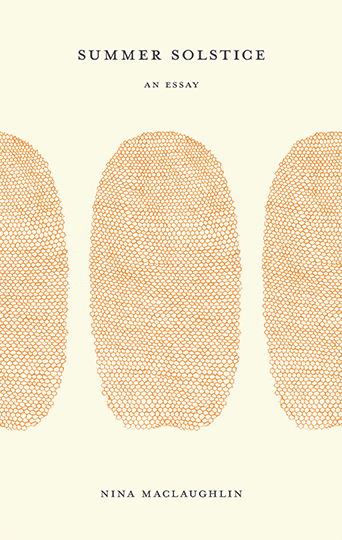
What does it mean to channel a season into art? The world of music composition is full of seasonally-themed work, some taking cues from Vivaldi’s The Four Seasons. Max Richter had a go at reimagining Vivaldi’s composition, while the likes of Anna Meredith (with ANNO) and Philip Glass (with Violin Concerto No. 2) have worked to create music that exists in a kind of seasonal musical dialogue. In the literary world, Ali Smith recently concluded her own seasonal quartet, and Tove Jansson’s The Summer Book remains a touchstone for many readers.
The notion of art about seasons is as challenging as art about, well, anything. For one person, summer can be a time for release and joy; for another, summer is a time of uncomfortable weather and copious sweat. All of this, then, makes Nina MacLaughlin’s task in Summer Solstice particularly imposing: just how does one distill a season into one long essay, spanning just over 60 pages?
MacLaughlin begins Summer Solstice with a memory which immediately connects to another memory. “It was early June, Saturday, midmorning on the Red Line,” she writes, and it’s there in the mist of travel that she’s approached about taking part in a project involving memory. MacLaughlin receives a memory from another passenger on the train, an archetypal one of summer camp and the proverbial great outdoors.
From there, MacLaughlin proceeds deeper and deeper into the subject of summer, cycling through both memories and creative works to explore perceptions of the season. That can yield unexpected but quietly thrilling juxtapositions, like D.H. Lawrence and Led Zeppelin showing up back to back on a single page. These surprising evocations offer the sense of Summer Solstice as the sum total of something much more vast.
While MacLaughlin does a fine job of gathering allusions and quotes together, she’s also adept at penning an evocative phrase. “I have murdered generations of fruit flies in my kitchen,” she writes in the essay’s final section, and it’s a sentence that neatly demonstrates MacLaughlin’s talent for being both evocative and concise. Those qualities are on display throughout this book; it’s a pocket-sized history of a season.
***
Summer Season
by Nina MacLaughlin
Black Sparrow Press; 64 p.
Follow Vol. 1 Brooklyn on Twitter, Facebook, and sign up for our mailing list.
